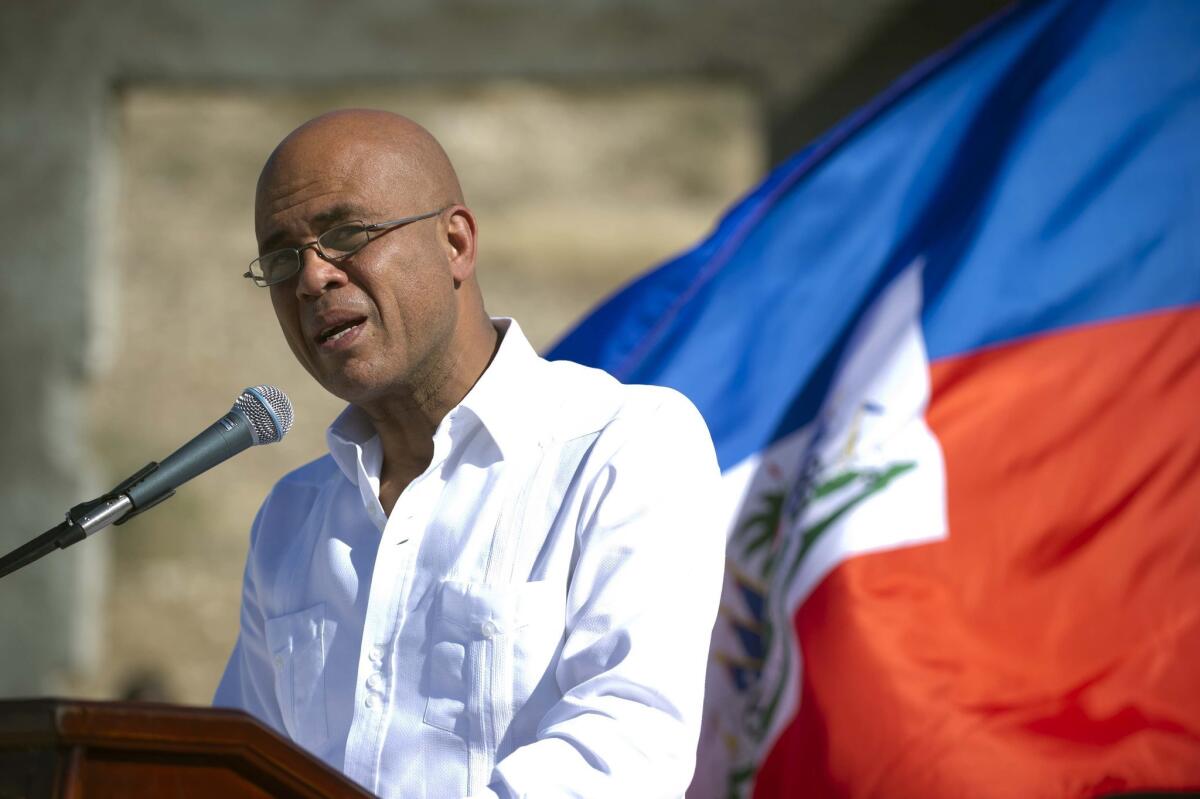Election deal reportedly reached in Haiti

- Share via
Reporting from Mexico City — After days of negotiations, the president of Haiti and opposition leaders have reportedly reached a deal aimed at ending a political impasse that had delayed elections and threatened the fragile nation’s recovery from a catastrophic 2010 earthquake.
President Michel Martelly emerged from talks in the Haitian capital of Port-au-Prince late Sunday to announce the agreement, which calls for elections this year -- four years behind schedule.
“Through this agreement, we are sure to achieve normalization of the political situation in the country,” Martelly said, according to the Associated Press.
Monday, which is also the fifth anniversary of the devastating quake, had been a hard deadline for the parties to reach some sort of accord because the terms of most members of the parliament expire at midnight.
With the parliament dissolved, Martelly would be free to govern by decree, a worrying prospect in a nation long ruled by cruel dictators. Martelly has said, however, that he would use the power only to put elections in place.
With the new agreement, which must be approved by lawmakers in an emergency session, elections are guaranteed by the end of the year, with Martelly leading a consensus government until then.
Separately, a nine-member electoral council will be created with Catholic, Protestant and voodoo representatives, as well as other citizens’ groups, the Agence France-Presse news agency reported from Port-au-Prince. Pointedly, no political parties or government representatives will be included.
Angry demonstrators have protested on a nearly daily basis for the last several weeks to demand an end to the political standoff, as well as Martelly’s resignation. The president sacrificed his prime minister last month, but that did not defuse the crisis.
Elections alone will not solve the impoverished country’s problems. International aid that has paid for post-quake recovery and helped Haiti sustain some economic growth in recent years is beginning to dry up. And even though a significant amount of reconstruction has taken place, tens of thousands of Haitians remain homeless after the Jan. 12, 2010, disaster, which killed more than 300,000 people and destroyed 1.5 million homes and scores of government buildings.
“[I]t is disappointing to see that progress is still being hampered by a few individuals in the traditional political class who continue to hold our political system hostage and who refuse to come together to move our beloved country to a brighter future,” Laurent Lamothe, the prime minister fired last month, wrote in an op-ed in the Miami Herald newspaper.
“In all of these discussions, the weakest are being forgotten in this political gridlock, and we risk years of progress in Haiti to be once again rolled back.”
Lamothe was writing before the new agreement was announced.
The international community welcomed the possible end to the impasse.
“Haiti needs steady and effective government and constructive opposition, rising above partisan differences, to steer the nation towards sustainable development,” European Union foreign affairs chief Federica Mogherini said in a statement. “I therefore expect all political actors in Haiti to assume their responsibility for stability and progress. … [Instability] could reverse the gains of recent years.”
For more news out of Mexico, Latin America, follow @TracyKWilkinson
More to Read
Sign up for Essential California
The most important California stories and recommendations in your inbox every morning.
You may occasionally receive promotional content from the Los Angeles Times.













